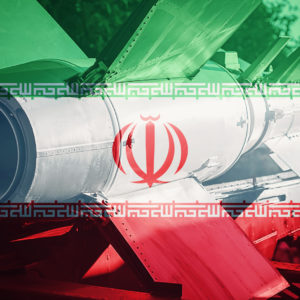The Biden administration — which repeatedly asserts that it has adopted tough policies on Russia’s war of aggression in Ukraine — plans to allow Moscow to receive a major economic windfall under a revived Iran nuclear deal.
The new accord reportedly contains terms that would grant Vladimir Putin’s regime more than $10 billion to aid the development of Iran’s nuclear projects, even as Putin’s army kills and maims innocent Ukrainians. President Biden must reverse course and block Russia from gaining financially under a renewed nuclear accord.
Team Biden is attempting to resurrect the nuclear deal with Iran, formally known as the Joint Comprehensive Plan of Action (JCPOA), that President Barack Obama concluded in 2015 and that President Donald Trump abandoned in 2018. That agreement will expire within the next decade and will allow Iran to enrich uranium to weapons-grade levels, thereby reducing the regime’s breakout time — that is, the amount of time it takes to develop enough fissile material for one nuclear weapon — to near zero.
Under the 2015 accord, the Obama administration permitted Russia the lead in carrying out several JCPOA nuclear projects in Iran related to Tehran’s “civil” nuclear program. Russia’s state-run nuclear agency, Rosatom, and its subsidiaries seek to resume such work in Iran, including a $10 billion project to complete two new units of Tehran’s nuclear power plant at Bushehr. Moscow could also recoup a $500 million debt for past work on the plant.
Four Rosatom entities — Rusatom Energy International, Atomstroyexport, TVEL Fuel Co., and Techsnabexport — stand to gain from supplying fuel to Bushehr and another small Iranian research reactor, removing used reactor fuel, overseeing operations, and carrying out new construction. TVEL Fuel Co. may also resume work at Iran’s underground uranium enrichment plant at Fordow, originally built by Tehran to make weapons-grade fuel for nuclear bombs.
Washington may also acquiesce to Russia’s Novosibersk Chemical Concentrates Plant — another Rosatom subsidiary — as well as TVEL Fuel Co. purchasing Tehran’s enriched uranium stockpile in exchange for a third-party nation’s natural uranium. Allowing Iran to import natural uranium ensures that Tehran can resume enrichment to higher levels and violate the nuclear accord at a time of its choosing.
In May 2019, as part of its maximum pressure campaign against Iran, the Trump administration announced it had ended special “waivers” from U.S. sanctions that permitted Russia’s Iran-related projects to move forward. Washington prohibited both the Russian Bushehr expansion project and the purchase of natural uranium. The Trump administration stated that any expansion of Bushehr beyond an existing unit and any transfers of enriched uranium out of Iran in exchange for natural uranium would be “exposed to sanctions.”
When Tehran quickly resumed — and then expanded — uranium enrichment at the Fordow plant in November 2019, the Trump administration also swiftly terminated the waiver for Russia’s work at Fordow. The Trump administration ended another sanctions waiver for Iran’s small reactor in May 2020, citing Iran’s continuing “nuclear brinkmanship” and Tehran’s “expanding proliferation activities.”
When the Trump administration announced that Russian entities would face sanctions for continued Iran nuclear work, those entities reportedly halted their efforts. Yet in February 2022, as part of its Iran deal diplomacy, the Biden administration unilaterally restored the sanctions waivers.
Last month, Russia abruptly forced a pause in the Iran nuclear talks, underway for more than a year, and demanded that the Biden administration provide Moscow with “written guarantees” that it won’t sanction Russian nuclear projects in Iran — projects that come with an anticipated price tag reaching into the billions.
Around March 15, the State Department reportedly provided the Kremlin with such guarantees. A week later, a State Department representative acknowledged that the Biden administration would “be willing to entertain” exempting Moscow’s work in Iran from U.S. sanctions over Ukraine.
Given the situation in Ukraine, Team Biden must change this policy. The Kremlin must not financially benefit from a restored Iran deal while Washington and its allies are attempting to pressure Moscow to halt its unprovoked invasion.
A wiser policy is for Washington to restore a campaign of economic pressure on Iran and persuade the regime to halt its growing nuclear provocations. Yet if the Biden administration insists on pursuing the JCPOA and helping Tehran refine its nuclear capabilities, there is no technical reason that Russia must be the party to perform such work.
U.S. National Security Adviser Jake Sullivan has underscored that the JCPOA parties “don’t have to rely on any given country for any particular element of the deal, but that is a role that Russia played in the past.” Instead, they can write Russia out of the new accord and assign the nuclear projects to the agreement’s other parties.
America and Europe should be making every effort to close Russia’s revenue streams. President Biden ought to recognize that this means not providing avenues via Iran to fund Putin’s war machine.


